Original Title: "How Did Binance's Zhao Changpeng, Who Fled Shanghai, Get Pardoned by Trump? — A Decade of Memories and Industry Puzzles from an Old Crypto Circle Veteran"
Original Author: JayZhou, 3 Point Blockchain
From the wild era of Beijing's Xierqi in 2014 to Trump's pardon in 2025, Zhao Changpeng's ten-year trajectory serves as a mirror reflecting the brutal growth of the crypto circle, regulatory storms, and power struggles. The details scattered throughout time have become keys to unraveling the "pardon puzzle."
First Encounter: The Vibrancy of Xierqi and the "Wild Era" of Crypto
1 The "Trio" in the Beijing Yiquan Hui Office
In 2010, I worked as a senior product operator for the open platform at Shanda Online, owned by Chen Tianqiao. At that time, Shanda Group had invested in hundreds of companies, including Moji Weather co-founded by Zhao Dong and Douyin, where Xu Mingxing served as CTO. My job was to integrate all the products invested by Shanda into our open platform. It was during this time, before I even knew about Bitcoin, that I met Xu Mingxing, who was responsible for connecting Douyin to the Shanda open platform. After I bought Bitcoin for the first time on November 22, 2013, I posted about it on WeChat Moments, receiving hundreds of likes and comments.
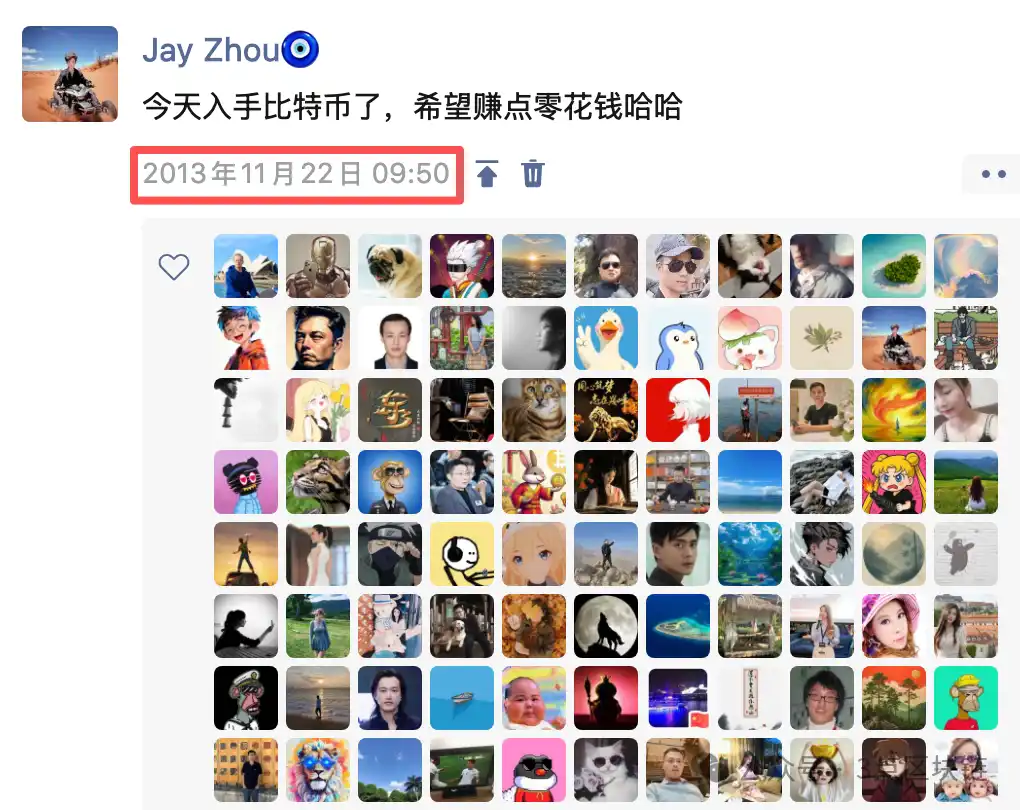
In 2013, CZ met a venture capitalist through poker, which opened the door to the world of digital cryptocurrencies for him. As a relatively early believer in cryptocurrency, when he saw how virtual currencies could facilitate rapid money flow, he seemed to glimpse the future. After that, CZ joined the digital wallet provider blockchain.info, embarking on a grand voyage into virtual currencies.
In 2014, blockchain was still a term that required a thirty-minute explanation. In the Yiquan Hui office building in Beijing's Xierqi, the sign read "OKCoin," which was the product of Beijing LeKuda Network Technology Co., Ltd. It later evolved into OKEX in 2017 and is now known as OKX.
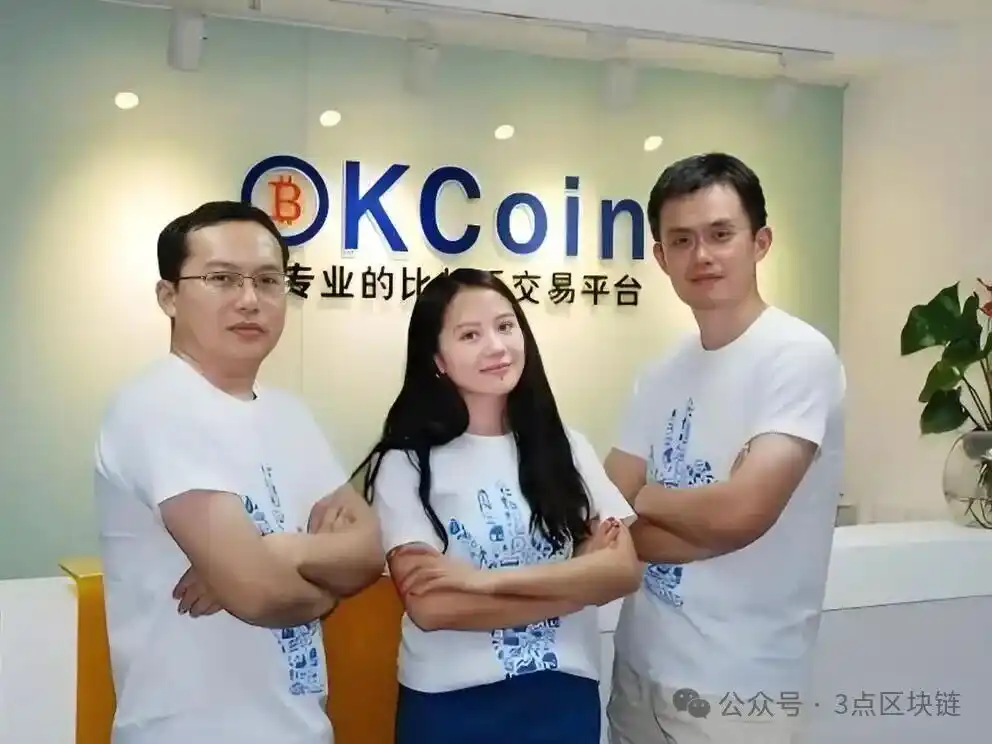
That day, Xu Mingxing hosted a gathering, claiming it was to "welcome the tech team." Pushing open the glass door, the twenty-square-meter office was crammed with over ten workstations, the sound of keyboards clattering in unison. Xu Mingxing, wearing a checkered shirt, approached and pointed to a man in the corner wearing black-rimmed glasses and a windbreaker, saying, "This is CZ, our new CTO, just back from Canada, he understands blockchain." He then pointed to a lady in a red dress beside him, "He Yi, responsible for marketing, formerly a host on Travel Channel." CZ was not very talkative, but when he started discussing the matching logic of Bitcoin trading systems, he suddenly opened up.
At that time, CZ had just left Blockchain.info, giving up a high salary in Silicon Valley to come to Beijing for a monthly salary of tens of thousands; He Yi had just left CCTV, abandoning a stable position to dive into the "virtual currency" field that few believed in; Xu Mingxing had even bet his entire fortune on Bitcoin trading, with his quilt still piled on a military bed in the office.
He mentioned that OKCoin's system throughput was insufficient and was contemplating optimizing the code, "Once we sort this out, the user base could triple." He Yi chimed in, joking that they should make a popular science short film explaining "What is Bitcoin?" so that "grandpas and grandmas can understand." That day's lunch was donkey meat buns from downstairs, and Xu Mingxing insisted on paying, saying, "The company has just turned a profit, we need to save money." Later, I learned that the crypto circle in 2014 was "wild yet pure." Everyone gathered simply because they "felt this thing had potential."
2 The "Initial Form" of the Community in Small Salons
From 2013 to 2016, crypto activities were mostly "ten-person level" small salons, held either in free meeting rooms of incubators or in the corners of garage cafes. I accompanied Xu Mingxing to a few of these, and almost every time I would see CZ, He Yi, Li Lin, Du Jun, and other future "big shots."
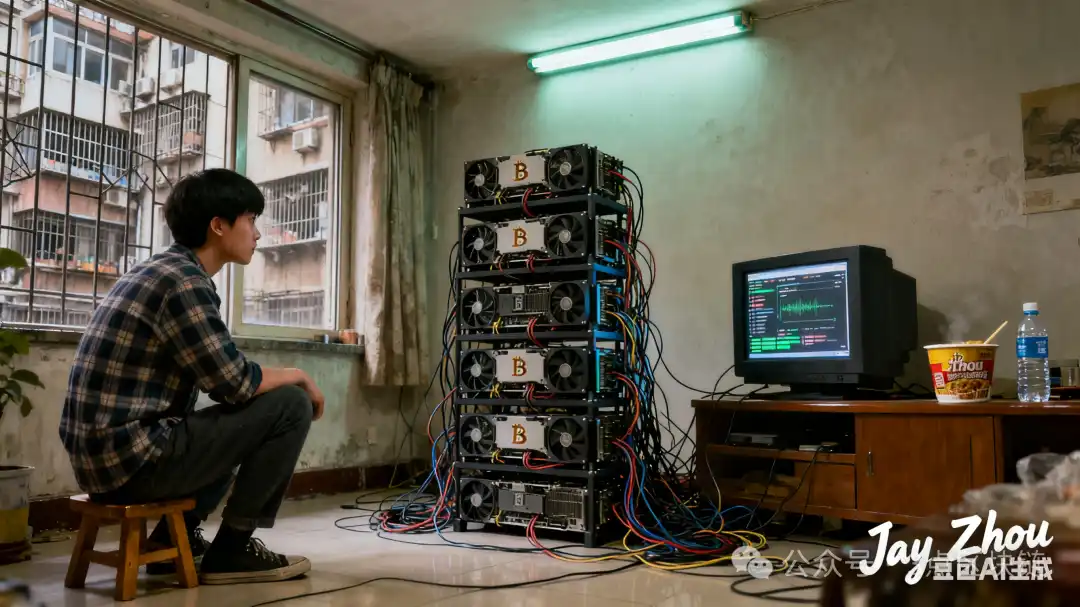
The most memorable was a salon in the winter of 2014, held on Entrepreneur Street in Zhongguancun, with the theme "The Development Trend of Bitcoin." Li Lin brought along the technical backbone of Huobi, holding a sample of a mining machine chip; he was handing out business cards everywhere with a backpack. He Yi was the most active, joking, "Although there are few people now, when the crypto circle becomes popular, we will hold a conference for ten thousand people." At that time, CZ had not yet revealed his "heroic" qualities and seemed more like an engineer obsessed with technology.
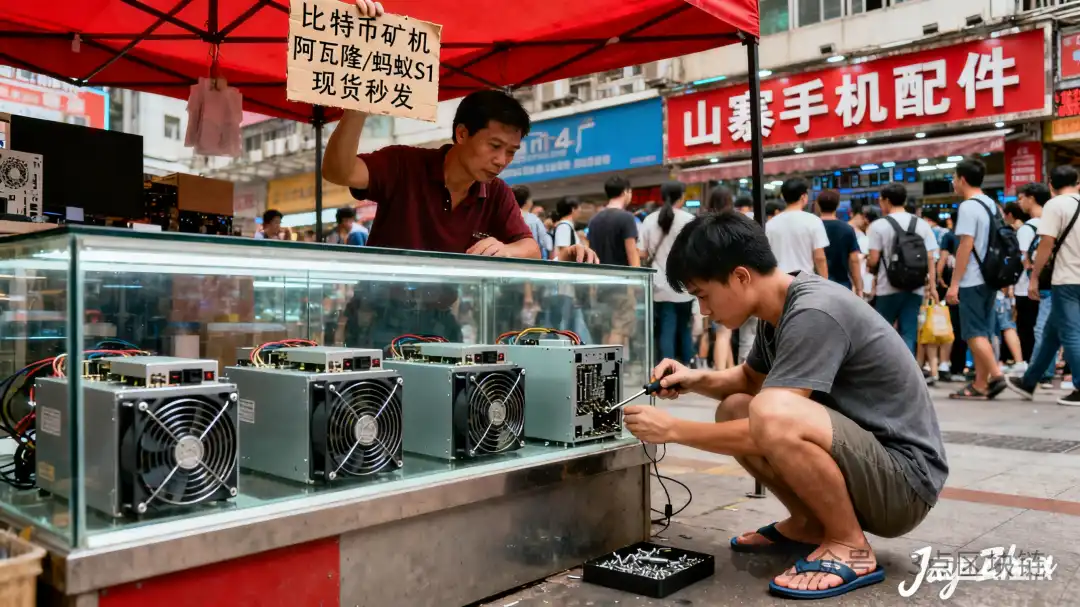
After one salon, he talked to me about his views on the industry, saying, "The biggest problems now are compliance and technology. Once we solve these two, blockchain can truly take off." No one expected that ten years later, it would be the word "compliance" that would lead him to experience imprisonment and then regain freedom due to a political struggle. In the WeChat chat records from those years, I still have his occasional shares: the "Chinese version of the Ethereum white paper" he forwarded in 2015, and in 2016 he reminded me to "pay attention to security vulnerabilities in exchanges," and in early 2017 he said, "I’m preparing to do something myself, let’s chat in Shanghai if there’s a chance." Looking back now, I realize the foreshadowing of fate had already been laid.
Rise: The "Binance Speed" at Shanghai SOHO and the Night Before Going Overseas
1 I Recommended Candidates to CZ at the Startup Binance in SOHO Fuxing Plaza
2017 was the "explosion year" for the crypto circle and also a "turning point" in CZ's life. That year, he left OKCoin to found Binance, building the initial team at Shanghai SOHO Fuxing Plaza, and hurriedly took the team overseas after the "94" storm. I was fortunate to witness this history of "lightning rise and lightning migration," where the details in the office held the codes to Binance's later fate.
On August 2, the price of BNB was 0.8 yuan per coin. I arranged to meet CZ for the first time at the Binance office he had just established. The address was in Shanghai SOHO Fuxing Plaza, right above Xiaohongshu. The office was small, with dozens of people crammed into workstations, and CZ's desk was in the corner, next to a few boxes of bottled water. At that time, He Yi had not yet joined Binance; he told me, "I've been busy with Binance's globalization lately, many people have reached out for collaboration through events" — at that time, Binance had just launched, and offline events became their main way to "quickly link resources." He even asked if I was interested in joining Binance. As someone who had been in the crypto circle since 2013, I was definitely very interested, but our P2P platform was in the midst of a three-year event, so I told Changpeng that once I finished this busy period, I would help him out, but in the meantime, if he had any issues, I could assist him.

Since I started blogging in college, I met many big shots from internet companies, and many people sought my help to get jobs at these companies. I joined Alibaba Group right after graduating from college and recommended over 100 people into the company. I also helped many early crypto companies by recommending candidates, so I had built a resume database of about a million people. Later, I worked as a CEO assistant at Kanjun and BOSS Zhipin, responsible for some product operations, marketing, strategy, and other business areas, continuously deepening my work in the internet human resources recruitment field. On August 24, 2017, I recommended my first friend's resume to CZ, at that time Binance only had three product managers.
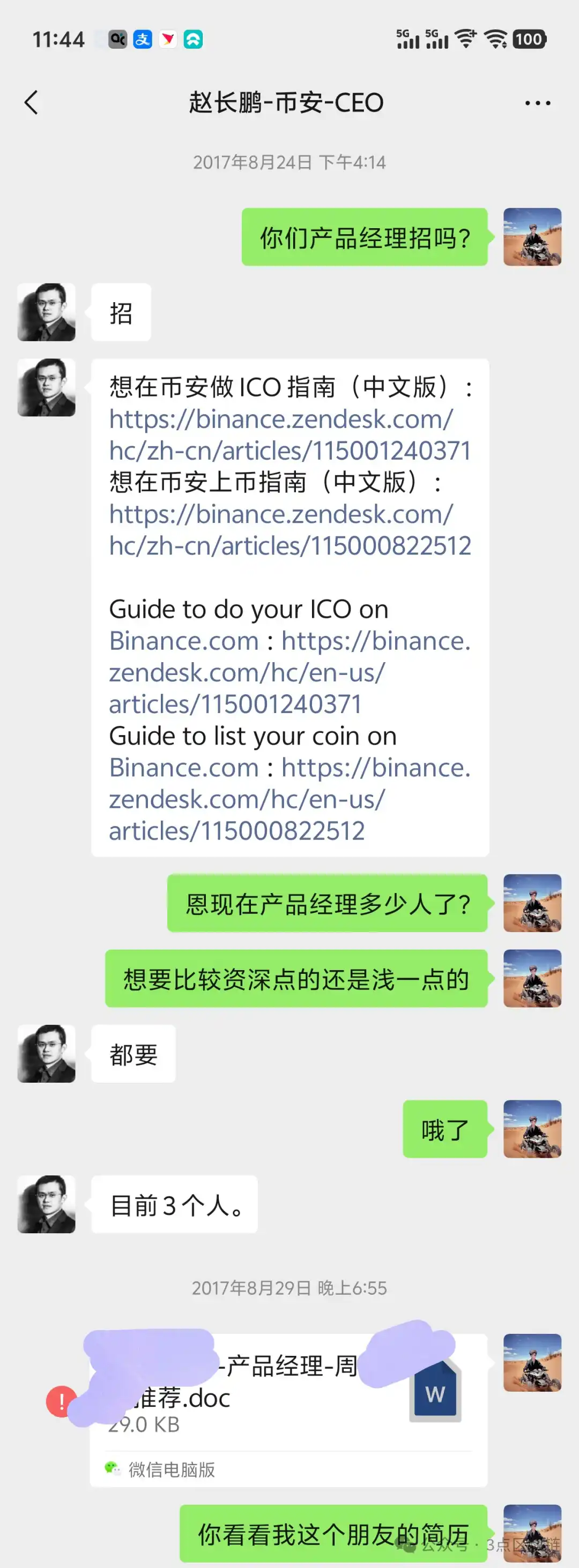
I recommended Binance to my friend, who thought the company's business was good but risky. I encouraged the candidate to be more proactive, as reliable startups like this were rare. At that time, CZ had invited me to dinner, but I was particularly busy with company business, so we agreed to meet after I finished up, and I first recommended other friends to help out.

In 2017, I left a strong impression as a reliable "part-time headhunter," having supplied a large number of talents to various internet companies. That day, Changpeng talked to me for two hours, his eyes full of excitement. He said Binance aimed to be "the fastest exchange in the world," already integrating over ten cryptocurrencies, and after launching, their fees would be half of Huobi and OKCoin. "Every day, people are reaching out to discuss cooperation; there are people sleeping on the office sofa every day," he pointed to a pile of sleeping bags in the corner. I noticed the notebook on his desk filled with compliance issues: "How to respond to regulations in different countries?" "How to build an anti-money laundering system?" Looking back now, these issues, which seemed to be overshadowed by "expansion speed" at the time, became hidden dangers later on. As I was leaving, he said, "Shanghai is a treasure land, with plenty of talent, especially people like you. We welcome you to recommend more talents to join Binance, and we also welcome you to join Binance quickly, as we are particularly short of operational talents like you!" After we finished our P2P company's third anniversary event, I didn't expect the "94" storm to come!
2 The Wanxiang Conference Amid the "94" Storm and the Decision to Go Overseas
On September 4, 2017, the central bank and six other ministries issued an announcement on "Preventing Risks of Token Issuance and Financing," completely halting ICOs and virtual currency trading, plunging the crypto circle into panic. My WeChat Moments were filled with news of "exchanges shutting down" and "currency prices crashing." I quickly messaged CZ, and he replied, "Don't panic, wait for my news, see you at the Wanxiang Conference in October." After the "94" incident in 2017, the Shanghai Wanxiang Blockchain Conference became the industry's "safe haven." I entered the venue with a media pass and ran into CZ and He Yi at the entrance. He was wearing a black coat, looking much more serious than before, saying, "We are looking for overseas office locations; the policies in Japan are relatively friendly." At that conference, Ethereum founder Vitalik Buterin was present, discussing "the importance of compliance in blockchain development." I asked several exchange founders about their plans, and they mentioned "clearing out domestic users and moving overseas." CZ revealed, "The Binance team will fly to Japan next week to rent an office in Tokyo as a transition." He Yi added, "We'll leave a few people in the Shanghai office to wrap things up; some equipment will have to be sold off at a low price, which is a pity."
In October, CZ and He Yi quickly arrived in Tokyo, standing in front of the new office window with the caption "Starting over." Looking at that photo, I remembered the folding bed in SOHO Fuxing Plaza and suddenly had a premonition: this team that fled Shanghai would stir the global crypto market in the future, but they might also face even greater storms.
No one expected that this "going overseas" was just the beginning of CZ's global migration. From Japan to Malta to Dubai, Binance's headquarters changed one after another, yet the "compliance" sword hanging over their heads was never fully resolved.
Decline: $4.3 Billion Fine and Four Months in Prison
1 Regulatory Storm: 18 Months from Indictment to Plea
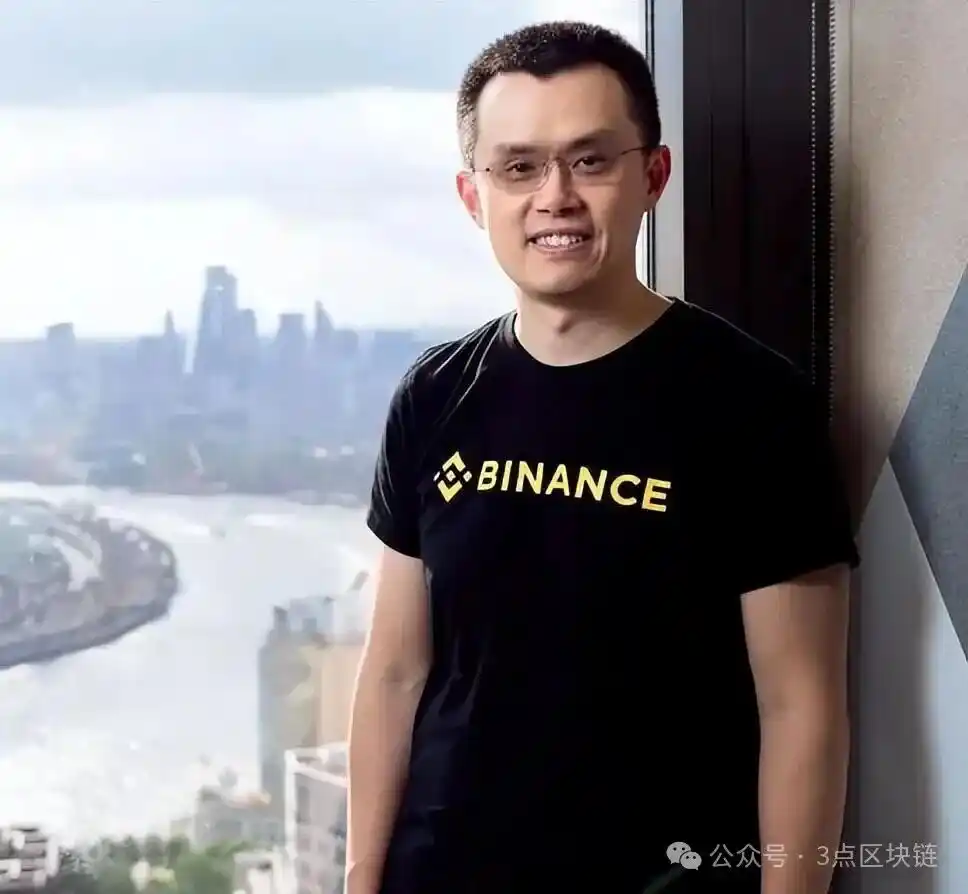
CZ's legal troubles began in March 2023. At that time, the U.S. Commodity Futures Trading Commission (CFTC) sued Binance and CZ, accusing them of "operating an unregistered exchange and violating trading rules." Shortly after, in June, the U.S. Securities and Exchange Commission (SEC) filed 13 charges, including "providing false trading supervision statements and selling unregistered securities."
When the news broke, I was attending an event in Hong Kong, and people in the crypto circle were discussing "Will Binance go bankrupt?" A lawyer friend familiar with U.S. regulations told me, "This time it's serious; the U.S. Department of Justice has long been focused on Binance's anti-money laundering issues." Indeed, in November 2023, CZ admitted in a Seattle court to "failing to maintain an effective anti-money laundering program" and resigned as CEO of Binance; Binance admitted to "participating in money laundering, unlicensed remittances, and violating sanctions," agreeing to pay a massive fine of $4.32 billion—of which $2.51 billion was forfeited, and $1.81 billion was a criminal fine.
The $4.3 billion fine set a record in the crypto industry. I recalled Xu Mingxing saying "to save money" in the Xierqi office in 2014, and looking at the current fine amount, I couldn't help but reflect on the industry's changes. Some old OGs in the WeChat group said, "Back then, Binance captured the market with low fees, and the anti-money laundering system couldn't keep up; now they are paying for their expansion speed." After pleading guilty, CZ wrote an apology letter stating, "I should have focused on compliance issues from the beginning and am willing to take full responsibility." But it was too late for regrets. On April 30, 2024, the U.S. Federal Court in Seattle sentenced him to four months in prison, which, although far less than the three years sought by prosecutors, made him "the only founder in the crypto industry in U.S. history to be imprisoned solely for violations of the Bank Secrecy Act."
2 Time in Prison and "Timely Assistance" from Dubai
From April to September 2024, CZ served his sentence in Lompoc Prison, California. During that time, discussions in the crypto circle shifted from "Will he be sentenced again?" to "Can Binance survive?" Just when everyone thought Binance was on the verge of decline, in March 2025, shocking news hit the industry: UAE-based artificial intelligence investment firm MGX invested $2 billion in Binance. This was not only Binance's first institutional investment but also the largest single investment in the history of the crypto industry.
MGX is not an ordinary investment firm; it is backed by the Abu Dhabi sovereign fund and serves as a core platform for the UAE's AI and blockchain initiatives. The investment was made in stablecoins, and MGX acquired a minority stake in Binance. Market speculation placed Binance's valuation between $20 billion and $40 billion—though far below the rumored $200 billion in 2021, it was enough to help Binance weather the storm. Friends close to Binance revealed that this investment was personally negotiated by CZ after his release. On September 27, 2024, CZ was released early due to his release date coinciding with the weekend. His first stop after prison was Dubai, where he met with MGX's leadership. Dubai's willingness to provide "timely assistance" was partly due to its interest in the development potential of blockchain, aiming to create a "global crypto center." On the other hand, Binance's user base and technical capabilities remained intact, and the $2 billion investment could help Dubai quickly seize a leading position in the industry.
After his release, everyone understood that as long as the "criminal record" in the U.S. remained, he could not truly return, and Binance would struggle to re-enter the U.S. market. At this time, another key figure—Trump—entered the crypto circle's view.
Reversal: Trump's Pardon and the Underlying Interests
1 Behind the Pardon: Trump's "Crypto Card"
On October 23, 2025, when Trump announced "the pardon of CZ" in front of the media, I was at the main forum of the Shanghai Wanxiang Blockchain Conference. The old OGs around me erupted in excitement; some pulled out their phones to check the news, while others exclaimed, "This plot is more thrilling than a movie." What seemed like a sudden pardon was, in fact, a complex chess game interwoven with political calculations, business interests, and industry struggles.
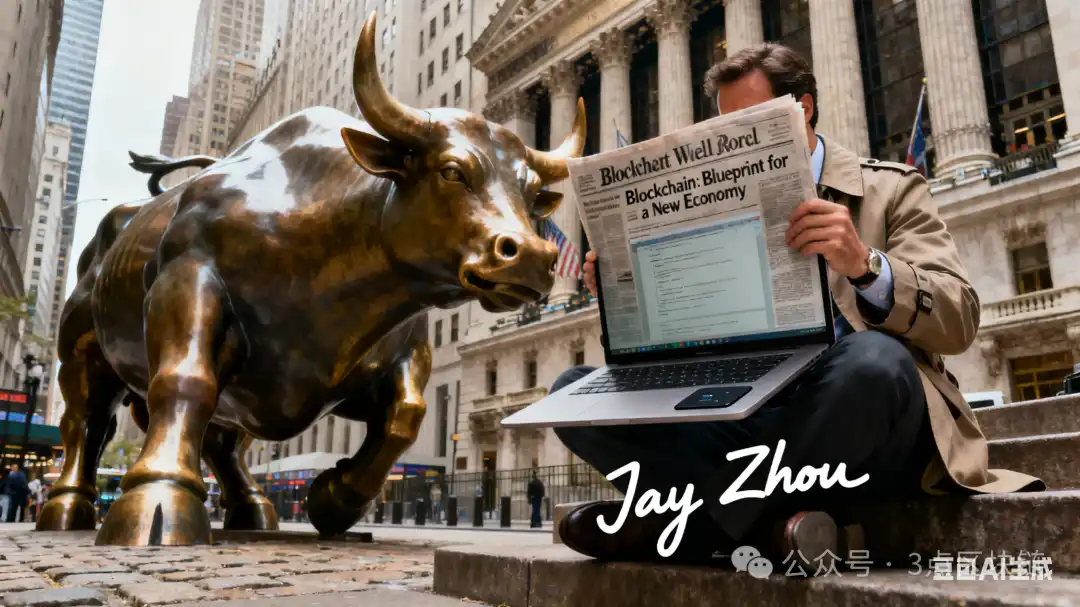
Trump's pardon of CZ was primarily aimed at solidifying his image as a "friend of cryptocurrency." Since taking office, he had been rolling back the Biden administration's enforcement actions against the crypto industry: pardoning Silk Road founder Ross Ulbricht, pardoning several founders of BitMEX, and now it was CZ's turn, continuing his policy trajectory.
White House spokesperson Levitt stated that CZ was a victim of the Biden administration's "war on cryptocurrency," and Trump's pardon was an "exercise of constitutional power." This statement made it clear to discerning observers that it was essentially a policy struggle between the two U.S. political parties regarding the crypto industry. Trump aimed to gain the support of young voters and tech capital by backing the crypto industry, and pardoning a "symbolic figure of the industry" like CZ was undoubtedly the most direct expression. However, more crucially, it involved the entanglement of commercial interests. According to the Wall Street Journal, Binance had begun engaging with Trump's allies around the time of the 2024 U.S. elections, forming a dedicated task force to explore the possibilities of "returning to the U.S. market" and "securing a pardon for CZ."
The breakthrough came from the Trump family's cryptocurrency company, "World Liberty Financial Inc. (WLFI)." Binance not only assisted WLFI in launching a stablecoin, which could generate tens of millions of dollars in annual revenue for the Trump family, but also discussed investing in WLFI in exchange for CZ's pardon. This maneuver was not without precedent: Tron founder Justin Sun had previously invested $30 million in WLFI, after which the SEC paused its fraud lawsuit against him.
Although CZ denied "trading for a pardon," the market generally believed that the logic of "commercial cooperation in exchange for political endorsement" had already been established. Trump himself admitted that the pardon was "at the request of many influential people," but emphasized that he had "never met CZ." This kind of rhetoric seemed more like a "political discourse," distancing himself from direct connections while achieving the goal of courting the crypto industry.
2 Barron Trump to Lead Binance U.S.?
After the pardon news broke, another explosive rumor began to circulate: Trump's youngest son, Barron Trump, might take the helm of Binance U.S. Although neither Binance nor the Trump family responded directly, this rumor was not unfounded.
Insiders revealed that Binance had long wanted to return to the U.S. market, but the 2023 plea agreement had tarnished its reputation in the U.S., making it difficult to find partners. Collaborating with the Trump family was undoubtedly the "best stepping stone." If Barron were to join Binance U.S., it could leverage the Trump family's influence to improve Binance's public image and utilize the Trump administration's policy tilt to quickly obtain compliance licenses.
For the Trump family, this would also be a lucrative business opportunity. As the crypto industry rises globally, investing in a leading platform like Binance U.S. would allow them to directly participate in market profit distribution. Analysts suggest that if Binance U.S. could restart, its valuation could reach several billion dollars, and even if the Trump family only held a minority stake, they could reap substantial returns.
Moreover, Barron Trump himself has shown a keen interest in technology and cryptocurrency, publicly expressing his optimism about blockchain technology multiple times in recent years. If he were to indeed take the lead at Binance U.S., it would not only help him accumulate business experience but also add an important piece to the Trump family's "political business landscape." Although the rumor has yet to be confirmed, from an industry logic perspective, the possibility of such a "strong alliance" is very high.
3 Industry Shock: The Chain Reaction After the Pardon
The news of CZ's pardon instantly triggered a chain reaction in the crypto market. The price of BNB surged that day, reaching an all-time high, and Binance's platform trading volume also increased by 30%. More importantly, this could allow Binance to end its three-year external monitoring period early—the 2023 plea agreement required Binance to undergo independent compliance monitoring, and the pardon might lead to the withdrawal of this requirement.
For the global crypto industry, this pardon sent a clear signal: U.S. regulation of the crypto industry is loosening. A friend from a compliance agency told me, "There will definitely be more crypto companies applying to enter the U.S. market; the Trump administration wants to make the U.S. the 'crypto capital,' which is good for the industry but may also bring new risks."
But doubts also exist. Democrats have demanded that the Trump administration provide detailed explanations regarding its interactions with Binance, stating that this "intertwining of business relationships and political pardons" raises serious ethical concerns. Some have even bluntly called it "blatant quid pro quo," which undermines the judicial fairness in the U.S. Among the old OGs in the crypto circle, opinions are more rational. Some say, "The pardon solves CZ's personal issues, but Binance's path to compliance is still long." Others lament, "Binance, which left Shanghai, now has to rely on American political power to turn things around; it's truly unpredictable."
Echoes: The Legend of Shanghai and the Future of the Industry
1 Shanghai: The "Origin Place" of Blockchain

On October 23, 2025, the Shanghai Wanxiang Blockchain Conference was still bustling with activity. On the main stage, Dr. Xiao Feng was giving an impassioned speech. Young entrepreneurs were sharing application cases of "AI + Blockchain"; in the exhibition area, newly established project teams were busy handing out flyers; during the coffee break, I encountered some newcomers who saw me wearing a BINANCE shirt and asked if I worked for Binance. I said no, but my connections with them were intricate; they had heard I knew CZ and surrounded me, asking, "Was the office in Shanghai really that shabby back then?"
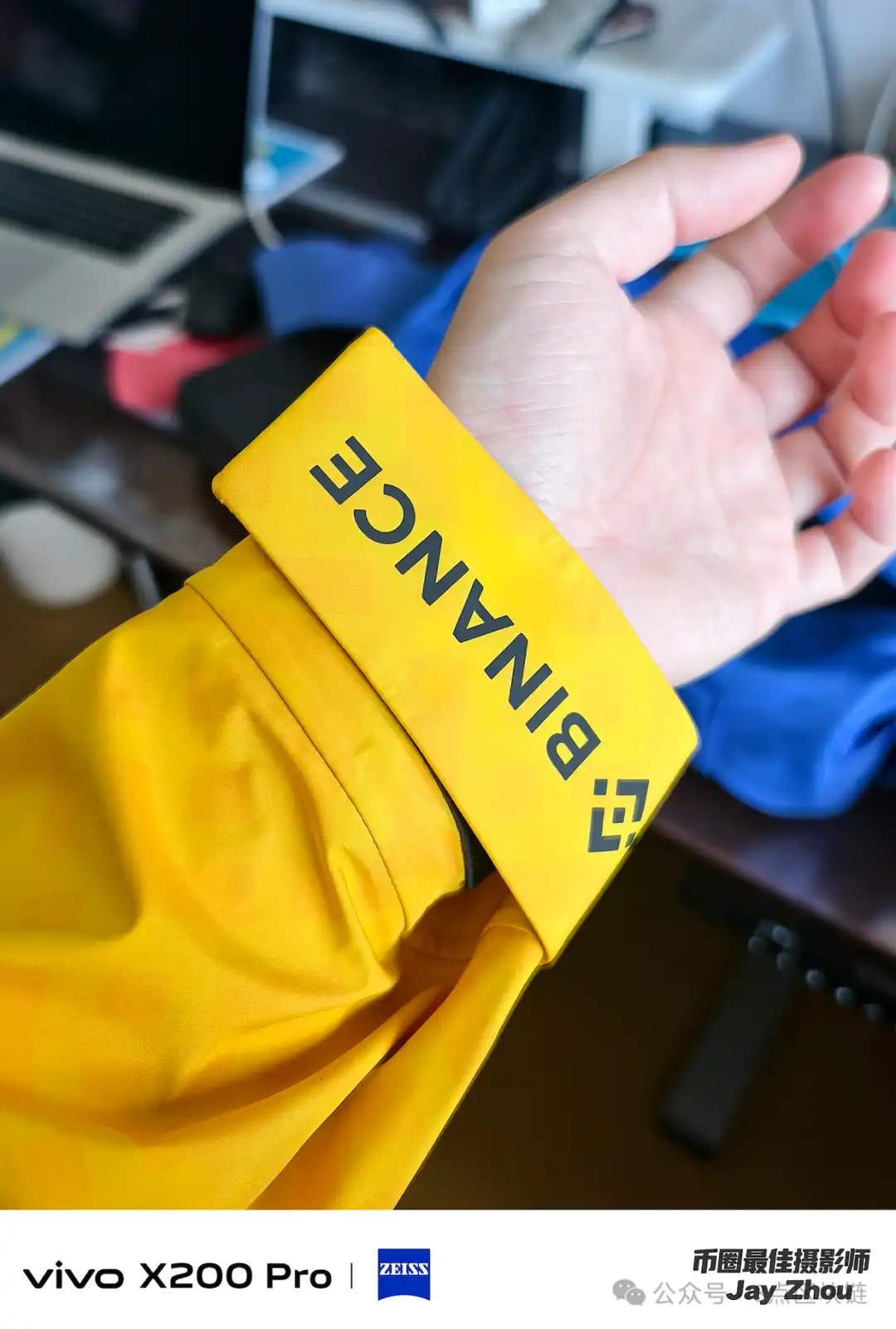
Looking at these fresh faces, I suddenly realized: the crypto circle is no longer the small group of "a dozen people in a salon" it once was. But those old stories and old places still circulate in the community, especially the Shanghai SOHO Fuxing Plaza from July to October 2017, where the Binance dream began. Today, Shanghai has become the city with the most open blockchain policies in the country. The tech industrial park has launched a series of policies such as "enterprise subsidies" and "talent settlement," and by 2024, Shanghai's blockchain-related industries are thriving. The annual Wanxiang Blockchain Conference has become a "barometer" for the domestic blockchain industry.
But the old OGs know well that the most precious things are those "historical imprints." The OKCoin office in Beijing's Xierqi has long moved out, but the security guard at Yiquan Hui office building can still recount, "There was a bespectacled Canadian technician who worked overtime every day back then"; the old Binance office in Shanghai SOHO Fuxing Plaza is now rented to an internet company, but the coffee shop owner downstairs still remembers "a group of young people rushing in with laptops to order takeout"; at the Wanxiang Blockchain Conference venue, you can still find photos from Vitalik's speech in 2017.
During the conference, I specifically visited SOHO Fuxing Plaza, standing at the elevator entrance on the 15th floor, as if I could still hear He Yi shouting "Keep it up" and see CZ resting on a folding bed. The security guard nearby, hearing that I was looking for "the old Binance office," smiled and said, "People often come to ask; I heard that company is doing very well abroad now?" I nodded, but my heart was filled with mixed emotions.
Shanghai's inclusiveness and openness nurtured the initial form of Binance; yet the baptism of the "94" storm forced Binance to go overseas. Today, Shanghai continues to support blockchain development, and Binance has also established a foothold abroad, but that "Shanghai version of Binance" forever remains in the autumn of 2017.
2 The Jianghu of the Elders and the Era of the Newcomers
At the dinner table, after discussing CZ, the conversation naturally shifted to figures like Xu Mingxing, He Yi, Li Lin, Du Jun, and Bao Er Ye, the "elders." Some said Xu Mingxing's OKX is now focused on compliance; others said He Yi is indeed a diligent "customer service"; some remarked that Li Lin's Huobi has been consistent; others noted that Zhao Dong, who once nibbled on donkey meat buns in a garage coffee salon, has now become a "senior" in the industry. Their stories are, in fact, a microcosm of the past decade in the crypto circle: from wild growth to compliant development, from domestic layout to global expansion, from technological obsession to commercial maturity.

Meanwhile, the young people around are focused on "MEME," "decentralized DEX," "regulatory sandbox policy opportunities," and "RWA." They have not seen the shabby office in Xierqi, nor experienced the panic of "94," yet they enter the industry with more professional knowledge and clearer plans. Just like this Shanghai Wanxiang Blockchain Conference, 90% of the attendees were young people under 30, and the topics they discussed have far exceeded the scope of "What is Bitcoin?" from back in the day.
A newcomer told me, "CZ's story is legendary; when we work on projects, the first thing we consider is compliance; we won't follow the old path anymore." I felt a deep sense of emotion: the elders paved the way with their lessons, and the newcomers are steadily moving forward on this path; perhaps this is the inevitability of industry development.
3 The Future: The Balance Between Compliance and Innovation
CZ's pardon, while resolving his personal legal issues, also leaves deeper reflections for the industry: how should blockchain development balance innovation and compliance?
Binance's experience has already provided an answer: early rapid expansion can indeed capture the market, but neglecting compliance will ultimately come at a heavy price. The $4.3 billion fine and four months in prison are lessons that should awaken all crypto enterprises. Today, Binance, bolstered by MGX's $2 billion investment, is vigorously advancing compliance efforts and reportedly has obtained licenses in over ten countries worldwide.
Shanghai's development path may serve as another reference: through clear policy guidance and a sound industrial ecosystem, blockchain technology can innovate within a compliant framework. From supply chain finance to digital governance, from copyright protection to agricultural traceability, Shanghai's blockchain applications have long transcended the realm of "virtual currency," moving towards RWA and other real economies.
On October 24, 2025, CZ posted on X platform: "Thank you, President Trump; we will help the U.S. become the 'crypto capital.'" Meanwhile, on the last day of the Wanxiang Blockchain Conference in Shanghai, a roundtable forum on "Compliance and Innovation" was packed. On one side is the "political turnaround" of the world's largest exchange, and on the other is the "steady progress" of domestic blockchain; although these two paths seem different, they both point in the same direction: only compliant innovation can lead to long-term success.
Conclusion: The Jianghu is Not Far, the Legend Endures
Although Binance's headquarters is not in Shanghai, its connection to the city has never truly been severed.
Reflecting on the past decade, from the donkey meat buns in Xierqi, Beijing, to the pizza coffee in Shanghai, from the folding bed in SOHO Fuxing Plaza to the sovereign fund investment in Dubai, from courtroom confessions to Trump's pardon, CZ's story resembles an "epic" of the crypto circle. And those elders who lived through this era, those old places that witnessed it all, have become "living fossils" of the industry.
Some say the crypto circle is a "forgetful" place, where new projects and hot topics emerge daily, and old stories are quickly forgotten. But I don't think so. Just like that office in Shanghai SOHO Fuxing Plaza, like those familiar faces at the Wanxiang Conference, like the dinner among old OGs after CZ's pardon, these details have long been etched into the industry's DNA. The future crypto circle will see more "CZs," more "Binance stories," but the Binance dream born in that summer of 2017 in Shanghai, along with the memories of original intention, expansion, setbacks, and rebirth, will never be erased. Because it is not only the starting point of a company but also a youthful imprint of an industry.
The Jianghu is not far, and the legend endures. If you are a newcomer to #web3 #crypto #blockchain, you must study some previous history because this circle has never been smooth sailing. However, as long as you uphold the bottom line of compliance and maintain the original intention of innovation, you will surely see the light. Just as CZ said back in SOHO Fuxing Plaza: "Shanghai will always be the starting point for Binance."
免责声明:本文章仅代表作者个人观点,不代表本平台的立场和观点。本文章仅供信息分享,不构成对任何人的任何投资建议。用户与作者之间的任何争议,与本平台无关。如网页中刊载的文章或图片涉及侵权,请提供相关的权利证明和身份证明发送邮件到support@aicoin.com,本平台相关工作人员将会进行核查。



